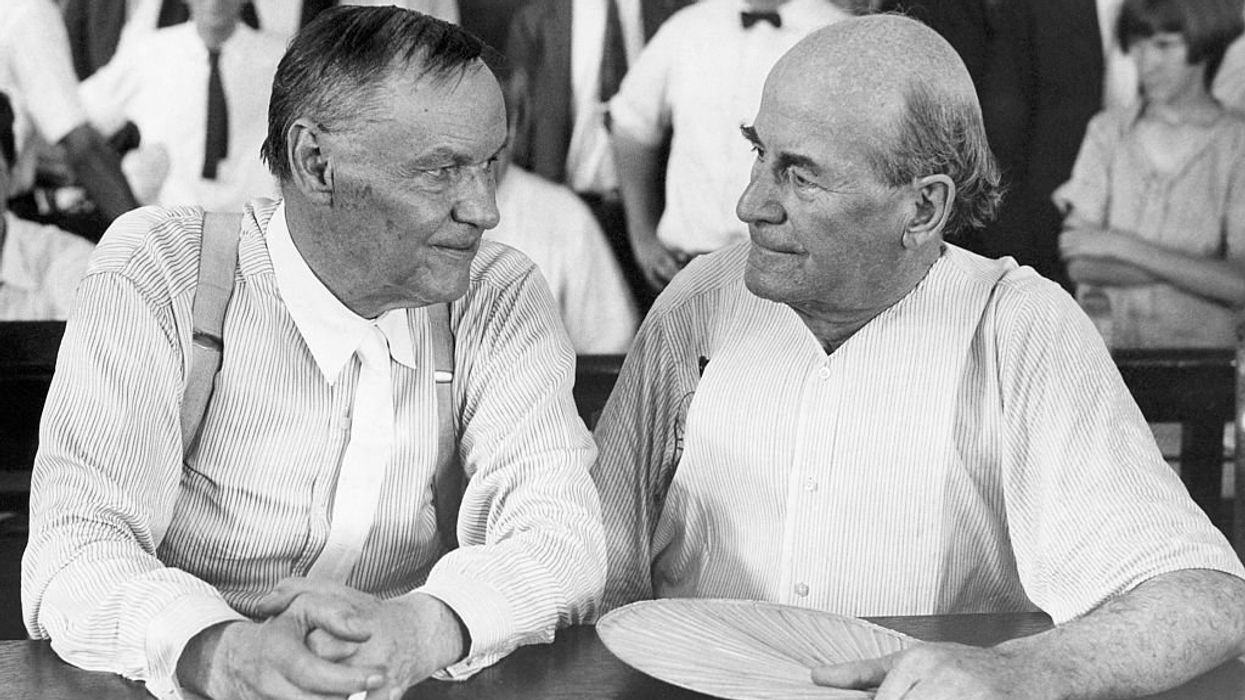
© 2025 Blaze Media LLC. All rights reserved.
"once you get a load of Newsweek’s cover, it’s immediately apparent that they have a point"
As Michele Bachmann's presidential campaign continues to intensify, so does the media's interest in her background, opinions and policy aspirations. Just days before the Iowa straw poll, the Minnesota congresswoman has landed major profiles in both Newsweek and The New Yorker. But, more interesting that the publicity itself are the quotations and contentions within each article.

Bachmann's Newsweek cover piece is curiously titled, "Queen of Rage." And, as can be seen from the image itself, the photo isn't the most flattering. The Washington Post's Jonathan Capehart writes:
There’s no denying that Bachmann firmly believes what she believes. Some might think she’s crazy because of it. Cover photos like this one help to cement that image.
In poking fun at Newsbusters' stance on the photo, Mediaite writes:
Their hearts are in the right place, but is Newsbusters really helping Bachmann out by starting a national debate about how crazy she looks?Newsbusters‘ headline [Newsweek Puts Picture of Michele Bachmann on Cover That Makes Her Look Crazy] might make you think they’re just being oversensitive, but once you get a load of Newsweek’s cover, it’s immediately apparent that they have a point.
In the end, there's no questioning the congresswoman's popularity, though some on the left (even some on the right) fail to see the appeal. But, considering her intensifying support, ignoring her isn't an option. This is a fact that likely served as a driving force behind these articles in the first place.
Newsweek's Lois Romano covers one reason why Bachman may be so popular in Iowa -- and among Republicans in general:
But in Iowa, Bachmann’s simple, black-and-white distillations of complex problems are cheered as refreshing and tough. It’s part of the reason she finds herself favored to finish near the top of the Ames Straw Poll on Aug. 13, the first political-strength test of the arduous 2012 presidential contest.
While Romano writes that "the elderly, the unemployed, the exasperated, and even a few disillusioned Democrats" attend Bachmann's rallies, these individuals also recognize, according to the writer, some of the "inherent contradictions" in Bachmann's "schtick."

Romano goes on to explain some of the hypocrisy Democrats and "some of Bachmann's Republican opponents" have seen in the presidential contender. Her former position with the IRS, her stake in a farm that received agricultural subsidies and earmarks are all mentioned as potential targets of criticism. Then, the Newsweek writer goes in for the kill:
But far more damaging than the charge of double standards may be the growing realization among Americans of just how radical the Tea Party movement really is. The willingness of its most committed members to risk national default for the sake of achieving its political goals has no doubt contributed to the dramatic rise in the number of Americans who view the movement unfavorably.
In the end, Romano frames Bachmann as a polarizing figure -- even within the Tea Party. While not entirely negative in its tone, the cover shot does little to add fairness to the magazine's package on Bachmann.
In the New Yorker piece, Ryan Lizza summarizes Bachmann's rise to fame as follows:
Her appeal, along with her rapid ascent in the polls, is based on a collection of right-wing convictions, beliefs, and resentments that she has regularly broadcast from television studios and podiums since 2006, when she was first elected to Congress.
When it comes to her faith, Lizza writes:
Bachmann belongs to a generation of Christian conservatives whose views have been shaped by institutions, tracts, and leaders not commonly known to secular Americans, or even to most Christians. Her campaign is going to be a conversation about a set of beliefs more extreme than those of any American politician of her stature, including Sarah Palin, to whom she is inevitably compared.
Throughout the piece, Lizza highlights some of the blips Bachmann has made along the way and covers a few of the stories and tales that some have sought to debunk. He describes Bachmann as "a tiny woman with a warm smile" and her husband as "not a small man." Interestingly, Bachmann's faith is explored in-depth, as is a trip she took to Israel after high school:
In 1974, the year Bachmann graduated from high school, she spent the summer on a kibbutz near Beersheba, Israel, with a program that was something like Outward Bound for Christians. The trip gave her a connection to Israel, a state whose creation, many American evangelicals believe, is prophesied in the Bible.
A common theme in both pieces, whether it was explicitly said or it resided just beneath the surface, is that Bachmann is extreme and does not hold views that mesh with the general public. But, many of the quotes used to prove this theory or to highlight the differences between the congresswoman and the American electorate were uttered years ago or are not necessarily shown in a grander context (i.e. Bachmann hasn't been able to address some of these issues yet on the campaign trail).
Is she outside the purview of the public on some issues? Possibly. But, the full scope of her belief system will not likely be out for the public to access until much later in the campaign's lifespan.
Update: See Newsweek's response to the controversy.
Want to leave a tip?
We answer to you. Help keep our content free of advertisers and big tech censorship by leaving a tip today.
Want to join the conversation?
Already a subscriber?
Billy Hallowell is a digital TV host and interviewer for Faithwire and CBN News and the co-host of CBN’s "Quick Start Podcast."
Billy Hallowell
Billy Hallowell is a digital TV host and interviewer for Faithwire and CBN News and the co-host of CBN’s "Quick Start Podcast."
more stories
Sign up for the Blaze newsletter
By signing up, you agree to our Privacy Policy and Terms of Use, and agree to receive content that may sometimes include advertisements. You may opt out at any time.
Related Content
© 2025 Blaze Media LLC. All rights reserved.
Get the stories that matter most delivered directly to your inbox.
By signing up, you agree to our Privacy Policy and Terms of Use, and agree to receive content that may sometimes include advertisements. You may opt out at any time.





